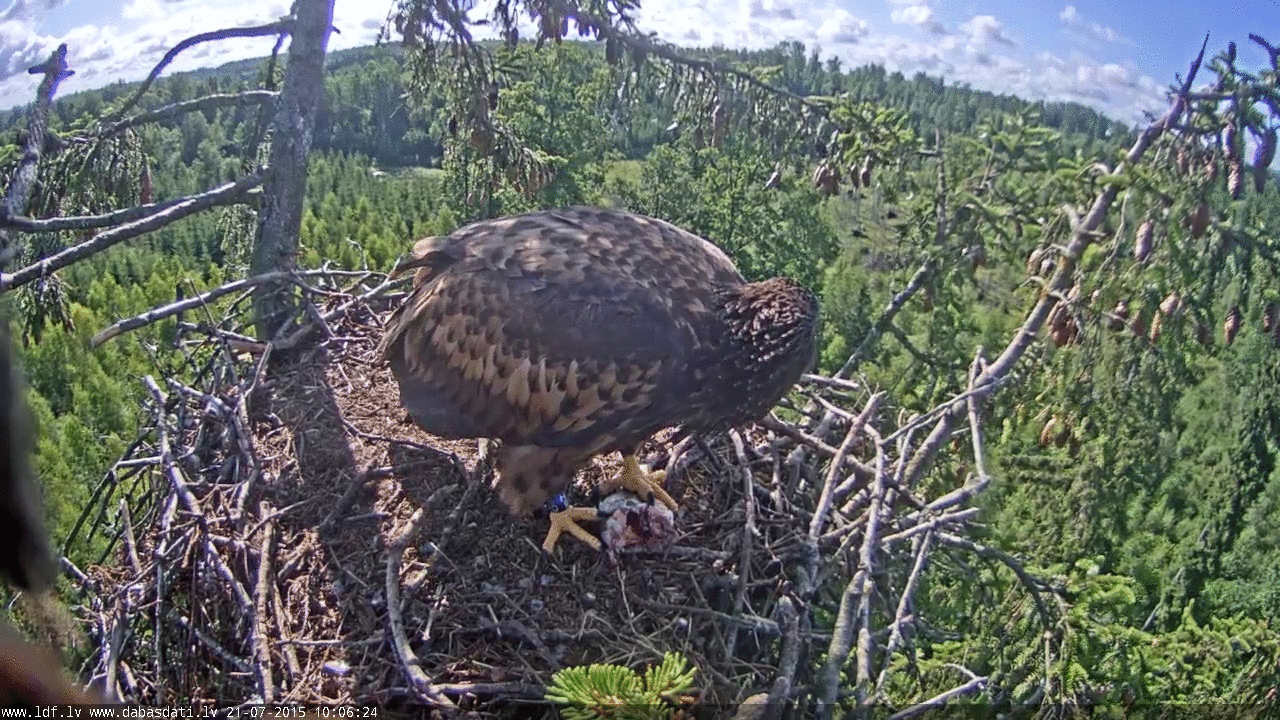Abigyl, i agree: he wasn't calling
Fish - fish - fish. he already saw a fish and got it from a parent who then flew out of his sight.

then something completely different. we have see a couple of times how Durberts has rubbed his bottom against the nest. last time he did so yesterday or the day before it. we have suspected that some sort of parasites may be the cause for this funny-looking behaviour.
Schleiereule has asked about parasites in birds of prey from this site:
http://www.greifvogelhilfe.de/krankheit ... parasiten/
this is the reply which she got. i'll put the original text here in German. then i'll try to translate it with help of GoogleTranslator, but i'm not sure how well i manage so i think it best to have the original text here for comparison. if i have made mistakes please correct me!
Hallo Frau ... (=Schleiereule51), ...
Ja sie haben Recht, bei Katzen und Hunden kenne ich dieses Rutschverhalten. In der Regel bei Bandwurmbefall oder Analdrüsenanschoppungen.
Dies ist mir bei Greifvögeln nicht bekannt. Wohl muss ich anmerken, dass wir keine Erfahrung bei Adlern haben (keine Verbreitung bei uns hier in NRW). Bei jungen Greifvögeln kommen meist keine Parasitosen in Frage, werden jedenfalls seltener nachgewiesen. Man könnte auch sagen, sie hatten noch kaum Zeit sich überhaupt anzustecken.
Dann wiederum unterscheidet man Greife und Eulen darin, wovon sie sich ernähren. Ein Oppurtunist hat viel eher Endoparasiten, als ein Vogel der sich auf etwas spezialisiert hat. Mäusebussarde sind zu 98% verwurmt, jedenfalls hab ich das Gefühl dass es so ist.
Würde dieser Vogel so viel Endoparasiten haben, dass er sich so verhalten müsste,
so wäre er sicher nicht mehr agil und munter.
Meist greifen Parasitosen um sich, wenn Vögel (auch andere Tiere) eine andere Krankheit haben.
Eine Problematik mit Lausfliegen, Zecken oder Milben halte ich für etwas wahrscheinlicher.
Gerade in den Sommermonaten vermehren sich diese Ektoparasiten rasant und nerven die Vögel auch sehr. Ich könnte mir so etwas vorstellen. Also Lausfliegen sogar am ehestens, die beißen ja auch und saugen Blut und lieben solche Nester. Zecken kommen nicht wirklich am Po vor, die sitzen in der Regel im Gesicht des Vogels, am liebsten im Augenbereich.
Ich persönlich habe keine Erkenntnisse zu Ihrer Beobachtung. Kann man eigentlich auch einen Blick auf die Webcam werfen?
Wir haben einen Seeadlerberinger zur Ihrer Frage heute befragt und er kennt so etwas nicht.
Vielleicht beruhigt Sie dies ein wenig.
Mit freundlichen Grüßen,
Sylvia Urbaniak
translation:
"Yes you are right, in cats and dogs I know this slip[ing] behavior, usually in case of tapeworm infestation or anal gland blockages.
[Analdrüsenanschoppungen; this i'm not sure about.]
These are not known to me at raptors. Well I have to say that we have no experience in eagles (no spread with us here in NRW). In young raptors mostly no parasites come into question, in any case proved rare. One could also say that they had little time to be infected at all. Then again, griffins [?] and owls are different because of what they eat.
An opportunist has much more internal parasites than a bird who specializes in something. Up to 98 % of buzzards are infected, at least I have the feeling that it is so.
If this bird has so much internal parasites that he had to behave so, he would certainly no longer agile and alert.
Most often birds (and other animals) get infected by parasites when they [already] have a different disease.
I think this is somewhat more likely that this is problem with louse flies, ticks or mites. Especially in the summer months, these ectoparasites multiply rapidly and annoy the birds also very much. I can imagine such a thing. Louse flies are most probable: they bite and also suck blood and love those nests. Ticks usually sit on the face of the bird, preferable near the eyes, and do not really go on Po.
[this i can't translate nor even guess: what po? "are out of the question"?]
I personally have no knowledge about your observation. Can you actually look at the webcam stream?
We asked an eagle ringer your question today and he knows no such thing. Maybe you calms it a little.
With kind regards,
Sylvia Urbaniak"
in the above i bolded the sentence which i think is the the most important. i have been worried that our Durberts and last year Makonite and Pukitis had bad internal parasite infections, but it seems that it's probably not so.
 (in my mind i was comparing our eaglets with kittens who quite often get infected by internal parasites from mother's milk and then suffer from them with swollen bellies. one sees these kittens especially in Southern Europe in the semi-wild cat colonies on holiday places like Rhodes.
(in my mind i was comparing our eaglets with kittens who quite often get infected by internal parasites from mother's milk and then suffer from them with swollen bellies. one sees these kittens especially in Southern Europe in the semi-wild cat colonies on holiday places like Rhodes.  )
thank you Schleiereule for finding this information for us!
)
thank you Schleiereule for finding this information for us! 
about lausfliegen, louse flies one can read more:
https://en.wikipedia.org/wiki/Hippoboscidae

